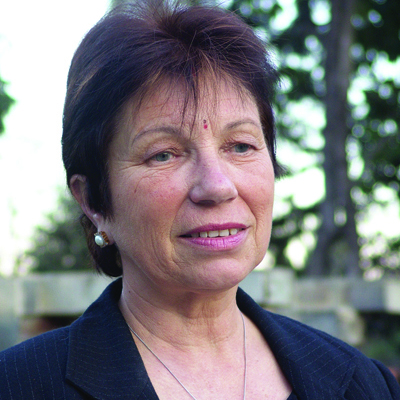I suppose it all started when Dhruba Chandra Gautam wrote ‘Alikhit’ and got the Madan Puruskar. (It was later translated into English as ‘Unwritten’ by philologist Philip Pierce.) The important thing for me about it was that it forged a friendship with another writer that became significant for me and which I value to this day.
Gautam had a column in one of the leading weeklies of Panchayat time. He asked Shanti Mishra, Chief Librarian at Tribhuvan University, if she could arrange an interview with me. I’ll never know whether he knew my writing or whether Shanti promoted it, but it happened.

During the interview I told him how I had attended the First World Conference of Women Writers in Jerusalem in 1984 and how the then Secretary of International Poets, Playwrights, Essayists, Editors and Novelists (PEN) had approached me about establishing a PEN Center in Nepal. We needed 20 members to sign the PEN Charter. The Panchayat would certainly not approve, but Gautam found 20 writers with lots of guts to do so.
Shanti became the first president. We were criticized for this because she wasn’t a writer, but only by those who had refused to sign up because of Panchayat censorship. A librarian had helped Galsworthy found the first PEN so Shanti was our help in founding PEN Nepal and worthy to be its first president. We met in the British Council. Peter Moss, the Head then, now deceased, was married to Norma, who is Monorama Mathai, the renowned Telegu writer.
Gautam and I went to Toronto for the official recognition of Pen Nepal. International PEN paid our expenses. I was Secretary and Gautam Vice-President. Shanti declined her right to go. In fact she never did go to a PEN Congress but always gave her seat to writers. This should be borne in mind because it was a tremendous help to Nepali literature.
We became an established center but were not legally established in Nepal until 1990 when the late Prime Minister Krishna Prasad Bhattarai as one of his first acts as prime minister made us legal.
I won’t mention the detractors we had, mainly those who declined to sign the charter. They were afraid and we understood that. Panchayat censorship was not a joke. But it is after all ‘the Pen that gives immortality to men’ and it is in this light that I hope PEN Nepal today honours those first 20 members who were not afraid to defend the freedom of expression in those days.
Among the 20 was Ashesh Malla, director of Sarvanam street theater. His group toured the campuses carrying a message of democracy through wit and humor in a language students could understand.
The sisters Benju Sharma and Manju Kanchuli, daughters of late laureate Bhim Nidi Tiwari carried on their father’s tradition. Toya Gurung was also a founding member. So was Bhuwan Dhungana whose short story ‘The 1’000 rupee note’ always seemed to me to be a great literary gem exploring the angst of the ordinary housewife trying to make ends meet. Megh Raj Manjul and Nagendra Raj Sharma were members. Others were Dhruba Sapkota, Binod Mani Dixit, and Hemang Dixit who writes as Mani Dixit, and who signed up despite being the physician to the children of most Panchayat heavies.
One campaign we ran was for the closure of Godavari Marble Quarry, that horrid blot on the landscape. We were privy through other writers of a proposal Kew Gardens had made which would have revived the area, provided sustainable incomes and, unlike the quarry, not deprived the surrounding villages of water.
Twelve thousand people marched for this cause. Krishna Prasad Bhattarai vowed that if he won a second term he would close it down. But he didn’t win and Nepal lost the man who many of us believe was the one just person in the political mayhem of Nepal.
With the help of Lawyers for the Environment we fought a case, the first ever on behalf of the environment in Nepal. Nepal had no environmental lawyers so one was asked to come from India. He fought that ‘locus stand’ case but unfortunately lost. The owners were too smart for us and knew who to pay off I suppose. The case went on and the quarry is now closed.
PEN Nepal’s proudest moment came when it became the first Third World Center to become a member of PEN’s prestigious Writers in Prison Committee, a movement predating Amnesty International. By then PEN Nepal had helped in a number of notable cases, particularly that of Taslima Nasreen. Gautamji was prepared to travel to Bangladesh and bring her over the border disguised as a bride. Many of our writers volunteered to hide her. Fortunately the Swedes managed to get her out.
For me the greatest honor came when I was made an honorary member of the Mexican Center San Miguel de Allende. I had written a letter to President Calderon about his imprisonment of the President of Mexican PEN. I reminded him of the values of Mexico’s great leader, Juarez, and asked if he believed Juarez would have approved of locking up writers. It must have worked because he released her and the writers thought my letter did it.
So that’s that, the advent of Pen Nepal. I ceased being active believing it was time for Nepal’s writers to take charge. They made me an advisor but they don’t need my advice. Literature in Nepal has a bright future and that is what I always hoped for.
The author is the founder of Pen Nepal











